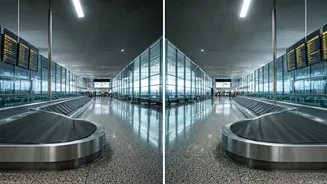Defining Airport Divorce
Airport Divorce represents a growing pattern of behavior during air travel, where couples choose a temporary separation to enhance their overall experience.
This concept goes beyond just spending time apart; it's about consciously allowing each partner to indulge in personal interests. Imagine one partner enjoys a quiet coffee while the other browses shops. The essence of the airport divorce is the acceptance of individual activities, which ultimately leads to a less stressful journey for both. It is a strategic way to navigate the challenges that can arise in airports. It is not about permanent separation, but a strategic pause to avoid conflicts and increase personal satisfaction during travel.
Why the Trend Exists
The popularity of Airport Divorce has grown due to the inherent stresses and potential conflicts of travel. Airports, known for their crowded spaces, long queues, and potential delays, can be a breeding ground for frustration. Couples often face disagreements over navigation, shopping choices, or waiting times. By adopting Airport Divorce, partners can sidestep these common issues. Each individual can tailor their pre-flight experience to their personal preferences. The benefit of this is a reduction in arguments. It allows a more relaxed and self-directed travel experience. The main goal is to arrive at the destination, both relaxed and happy.
Individual Freedom Gains
One of the major benefits of Airport Divorce is the opportunity it provides for individual freedom. In an airport setting, this means the liberty to explore interests without compromise. One partner might visit a bookstore, while another enjoys a massage. This separation fosters a sense of independence and self-care before a flight. This can be especially valuable for couples who spend considerable time together in their everyday lives. Airport Divorce is a chance to recharge, explore individual interests, and return to the relationship with a renewed sense of appreciation for each other. This ultimately results in enhanced well-being.
Minimizing Travel Stress
Another vital aspect of Airport Divorce is its role in decreasing travel-related stress. Travel can often trigger anxiety due to factors like crowded terminals, security checks, and flight delays. Having individual space helps reduce the chances of disagreements. Airport Divorce removes the need for constant joint decision-making. By allowing each person to manage their time and choices independently, it significantly cuts down the potential for conflict. This proactive approach helps pave the way for a more pleasant and enjoyable flight experience, making the trip better for both. As a result, travel becomes a lot more fun.
Planning an Airport Divorce
To implement Airport Divorce successfully, preparation and agreement are important. The first step involves open communication, where couples decide on the logistics and set clear expectations. They need to discuss how long they will separate, the meeting point, and what activities they will pursue individually. It’s also important to agree on communication guidelines, like the frequency of check-ins. Proper planning includes coordinating schedules, knowing each other's interests, and knowing the airport's layout. Making sure this is clear upfront removes any ambiguity and keeps the process smooth. Successful planning contributes to a successful Airport Divorce.
Relationship Benefits Explored
Beyond the immediate benefits of a stress-free travel experience, Airport Divorce can strengthen relationships. By permitting individual space and freedom, this approach encourages each partner to return to the relationship with a renewed sense of appreciation. The absence of conflict during travel can reinforce the positive aspects of the relationship. Having individual experiences and sharing those experiences later can also spark interesting conversations and create new connection points. This can improve communication between the partners. Airport Divorce is a clever and useful approach to make traveling with a partner better.



















